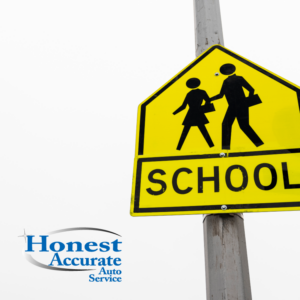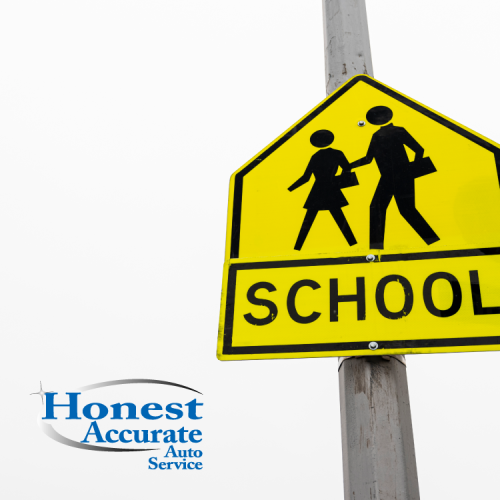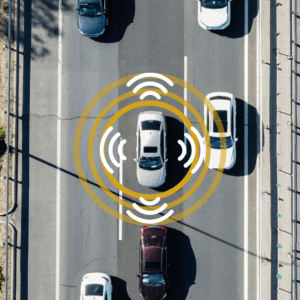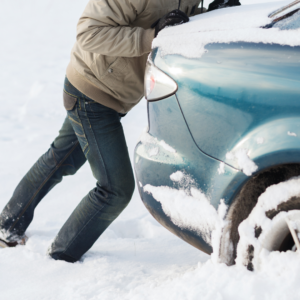Back-to-School Teen Driving Tips
We know that sending your kids back to school also means that many young drivers will be hitting the road more often – which is why we are sharing our best teen driving tips to help your young drivers stay safe on the road. No matter how well you teach your child while they are earning their driver’s license, no matter if you put them in the safest car for teen drivers, it is still pretty scary to watch them pull out of the driveway each day.

After all, it’s not just about whether or not your child is a safe driver. It also depends on how safe everyone else is driving. There’s a reason auto insurance for young drivers is more expensive. New drivers don’t have the experience to always react in a timely manner.
These tips for teen driving safety will help you prepare your young driver for life on the road in Colorado Springs, whether they have been driving for months or they are just learning with their permit.
1. Send Your Young Driver to a Driving School for Teens
The state of Colorado requires 30 hours of in-class driving school for teens who want to obtain a minor driver’s license. The state requires additional driver awareness classes and six hours of driving with an instructor. Additionally, your teen is also required to complete 50 hours of logged driving time with you and 10 hours of nighttime driving. This graduated driving program is recommended by Drive Smart Colorado. If your teen already has his or her Colorado teen driver’s license, you’ve already ticked off a key step in helping your teen have a safer driving experience.
If your teen is exempt from driving school due to distance (Colorado will exempt drivers who live too far from a driving school), you should still consider enrolling them in a driving program. If your child is experienced, adding a defensive driving course to their instruction is extremely helpful. Teen defensive driving school programs teach them about situational awareness, reaction and much more. Your driver will learn how to respond calmly when other drivers cause chaos on the roads. Colorado Springs defensive driving courses are available throughout the year.
One last insight about driving school. Colorado Springs driver’s license offices no longer administer drivers’ tests in Colorado Springs. In fact, you can no longer take them at any DMV. You must use an approved driving school to administer your test before your teen can go to the DMV for their license. Be sure to check out this list of state approved driving schools in Colorado.
2. Help Your Teen Avoid Distracted Driving
Distracted driving is deadly, especially for young teens who are still learning to drive. Your teen isn’t just risking their own life with distracted driving. One in five people injured by distracted driving weren’t even in the car. They were pedestrians or cyclists.
The CDC breaks down distractions into three groups.
-
Visual Driving Distractions
With teens (and adults), the number one visual distraction is the smartphone. You’ve probably read the fun fact that says your car can travel a football field length in the time it takes to send a text. Teens driving while texting won’t be able to recover in the event of an accident. Instruct your teen to turn on their phone’s safety mode while driving and avoid answering texts. Teach them to set a music playlist before driving so they won’t be searching for that perfect song while driving 55 miles per hour. It could save their lives – or their license! Per CDOT: “Teens under age 18 are prohibited from using a cell phone while driving. Teens can be fined and may risk losing their license.”
-
Physical Driving Distractions
Physical driving distractions interfere with the driver. With teens, these distractions typically boil down to passenger shenanigans, unsecured items, spilled drinks or eating while driving. There’s a reason Colorado teen driving laws won’t allow new drivers to have unrelated passengers in the car for the first six months. Teach your teen driver to avoid physical distractions and lead by example. Don’t eat a three-course meal while driving with your dog in your lap in front of them (or any other time).
-
Mental Driving Distractions
Mental driving distractions are the hardest to recognize, even for adults. Help your teen understand when it’s better to sit tight for a minute and calm down than try to drive while emotional or angry. Distracted driving in teens can be caused by the same stressors adults experience, so be sure to model that good behavior too.
One of the rules of defensive driving – probably the most important – is to pay attention. If there is one teen driving safety tip you gain from reading this, it’s to be aware of your surroundings and keep your mind and eyes on the road.
3. Teach Your Teen About the Dangers of Driving Under the Influence
You may think that your teen will never drive drunk, but it’s really important that you still have the hard conversations about why it’s so dangerous. Peers can heavily influence your teen when you’re not around. Even the best behaved kids can make bad decisions. Create an action plan for your teen driver on what to do if they are under the influence. You should also create a plan if they are stranded by a fellow driver who has been drinking. Your teen doesn’t have to be the driver for teens drunk driving to put them in danger.
Stress that driving under the influence could cost your teen their license. It could also impact their future prospects with regard to college. There are lifelong consequences to teens driving drunk and the more seriously they take your words, the more likely they are to make the right decision when the time comes. Teen drunk driving statistics have been steadily dropping for the last three decades. A key part of that decline is parental involvement.
4. Accident Tips for Teens
Does your teen know what to do in a car accident? You may not be a phone call away if your teen gets in a crash. Teen car accident rates are notoriously high. Whether that’s due to teens and distracted driving or a lack of experience avoiding other texting drivers (who are often adults), it’s a reality. Driving tips for new drivers should always cover what to do when the worst occurs. Walk your teen through the basic steps following an accident.
- Check for injuries
- Call the police
- Call parents
- Begin taking photos and videos
- Fill out our printable car accident form
- Stay calm
Honest Accurate has a helpful blog that can guide you further on how to document a motor vehicle accident.
5. Traffic Stop Tips for Teens
Does your teen know what to do during a traffic stop? Chances are your driving time with your kid did not include a lot of traffic stops and speeding tickets. If they did, skip this section (and maybe look into those driving schools above).
Your teen should know how to safely pull to the side of the road when sirens and lights are flashing. They should also know that they can turn on their hazards and drive to a safer location if there is no shoulder. However, if they choose to pull over (safely) immediately and let the police officer direct them to move to a different location that is also acceptable.
Once stopped your teen should:
- Put the car in park.
- Retrieve the insurance and registration from the glove box.
- Remove wallet from license.
- Greet the officer.
- Listen to their reasoning for the stop.
- Provide requested information.
- Stay in the car unless instructed otherwise.
If you like, you can also instruct your teen to call you if they are pulled over and you can instruct them what to do.
We hope these back to school driving safety tips can help you have peace of mind when they head off to school. If you want even more peace of mind, swing by Honest Accurate. We’ll inspect your brakes, lights, tires and other key safety features to help you ensure your young driver is safe on the road.




